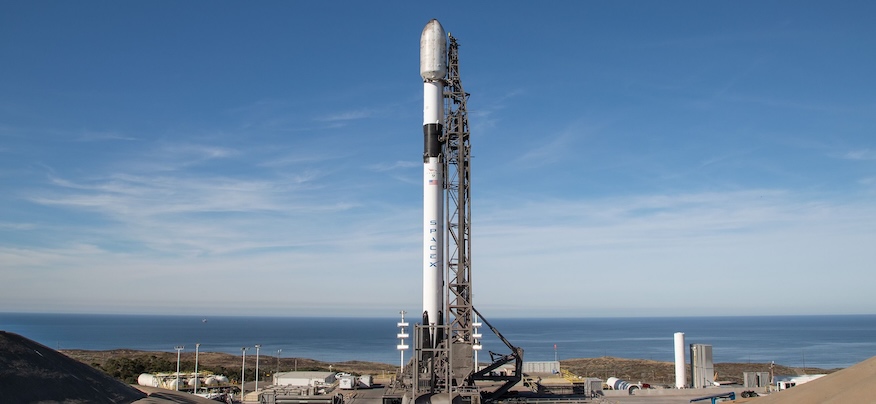
A Falcon 9 rocket stands ready to support the Starlink 7-9 mission from Vandenberg Space Force Base. The mission also includes the first six satellites that will be used for the company’s direct-to-cell service. Image: SpaceX
Falcon 9 로켓은 Vandenberg Space Force Base의 Starlink 7-9 임무를 지원할 준비가 되어 있습니다. 이 임무에는 회사의 직접 셀 서비스에 사용될 처음 6개의 위성도 포함됩니다. 이미지: SpaceX
Update 1:13 a.m. EST: SpaceX delayed the launch until Friday night at 9:19 p.m. PST (12:19 a.m. EST, 0519 UTC).
업데이트 오전 1시 13분(EST): SpaceX는 금요일 밤 오후 9시 19분까지 발사를 연기했습니다. PST(오전 12:19 EST, 0519 UTC).
SpaceX is looking to rebound from a week of scuttled launches with a Falcon 9 launch from California. The Starlink 7-9 mission will feature another batch of 21 satellites heading up to low Earth orbit, something that has become almost routine for the company.
However, this late night Friday mission is unique in that it will include the first six Starlink satellites that feature direct-to-cell capabilities. SpaceX stated that the new function “will enable mobile network operators around the world to provide seamless global access to texting, calling and browsing… on land, lakes or coastal waters.”
그러나 이 늦은 밤 금요일 임무는 셀에 직접 연결하는 기능을 갖춘 처음 6개의 Starlink 위성을 포함한다는 점에서 독특합니다. SpaceX는 이 새로운 기능을 통해 "전 세계 모바일 네트워크 사업자가 육지, 호수 또는 연안 해역에서 문자 메시지, 전화 및 검색에 대한 원활한 글로벌 액세스를 제공할 수 있게 될 것"이라고 밝혔습니다.
Liftoff of the Falcon 9 rocket supporting the mission is targeting the opening of the launch window at 9:19 p.m. PST (12:19 a.m. EST, 0519 UTC). Spaceflight Now will have live coverage of the mission starting about 30 minutes prior to liftoff.
This direct-to-cell promise for the Starlink network is the beginning of a promise announced by SpaceX founder Elon Musk during an event in August 2022 with T-Mobile CEO and President Mike Sievert at Starbase in Texas.
Musk described the capability as a “massive game changer” that would eliminate dead zones in even the most remote parts of the world.
“This really is a big deal,” Musk said during the presentation. “Even if an entire region or country lost connectivity because of a severe hurricane or floods or fires or tornados, earthquakes… even if all the cell towers were taken out, your phone would still work.”
머스크는 프레젠테이션에서 “이것은 정말 큰 일이다”라고 말했다. "심각한 허리케인이나 홍수, 화재, 토네이도, 지진으로 인해 전체 지역이나 국가의 연결이 끊어지더라도... 모든 기지국이 철거되더라도 휴대전화는 계속 작동합니다."
According to a Nov. 30, 2023, email sent to Kathyrn Medley, the acting division chief of the Federal Communication’s (FCC) Satellite Licensing Division, SpaceX anticipates launching “approximately 840 direct-to-cell capable satellites over the next 6 months, with additional launches continuing after that period.”
Jameson Dempsey, SpaceX’s director of satellite policy and the author of the email, wrote that the planned and future launches would “ensure that we can launch a critical mass of satellites in time to deliver commercial service later in 2024.”
SpaceX의 위성 정책 책임자이자 이메일 작성자인 Jameson Dempsey는 계획된 발사와 향후 발사를 통해 "2024년 후반에 상용 서비스를 제공하기 위해 적시에 임계량의 위성을 발사할 수 있게 될 것"이라고 썼습니다.
“As such, while we understand that the Commission may limit our experimental authority to the satellites we expect to launch and testing the next 6 months, we request that the launch license include authority for all 7500 satellites in our direct-to-cell modification application,” Dempsey wrote.
Sievert noted during the August 2022 event that the upcoming service in the U.S. would use the existing T-Mobile mid-band PCS spectrum.
“That allows us to then dedicate that, working together, to the constellation that Starlink operates so that we are seeing those satellites from every corner of the country,” Sievert said. “If you have a clear view of the sky, our vision is you’re connected.”
"이를 통해 우리는 함께 협력하여 Starlink가 운영하는 별자리에 전념할 수 있게 되어 전국 각지에서 위성을 볼 수 있게 되었습니다."라고 Sievert는 말했습니다. "하늘이 선명하게 보이면 우리의 비전은 당신이 연결되어 있다는 것입니다."
“Your phone doesn’t know it’s connecting to space. It will scan for its home network, it’ll scan for terrestrial roaming partners as well,” Sievert added. “And if it fails to see those things, it will scan again and it will connect to the authorized connection from the satellite and it’ll think it’s connected to a cell tower because that phone is using industry standard technology communication protocols and it has the spectrum already built in. At least, the vast majority of phones in circulation today do.”
“당신의 휴대전화는 자신이 우주에 연결되어 있다는 사실을 모릅니다. 홈 네트워크를 검색하고 지상파 로밍 파트너도 검색합니다.”라고 Sievert는 덧붙였습니다. “그리고 이러한 사항을 확인하지 못하면 다시 검색하여 위성의 승인된 연결에 연결하고 휴대폰이 산업 표준 기술 통신 프로토콜을 사용하고 있기 때문에 기지국에 연결되어 있다고 생각할 것입니다. 스펙트럼은 이미 내장되어 있습니다. 적어도 오늘날 유통되는 대부분의 휴대폰에는 내장되어 있습니다.”
In addition to T-Mobile as a U.S. service provider, SpaceX said it has partnered with companies in Australia, Canada, Japan, New Zealand and Switzerland.
Originally, the plan was to launch the service using the Starlink V2 satellites, which may still end up hosting the majority of the on-orbit antennas. However, because of their size they would need to launch using Starship.
원래 계획은 Starlink V2 위성을 사용하여 서비스를 시작하는 것이었지만 여전히 대부분의 궤도 안테나를 호스팅하게 될 수 있습니다. 그러나 크기 때문에 Starship을 사용하여 실행해야 합니다.
Musk said during last year’s event that the antenna would be about five or six meters on one side or roughly 25 square meters. He noted that the Starlink V2 Mini satellites would need to work as a holdover solution, if Starship were “delayed longer than expected,” which turned out to be the case.
The six direct-to-cell satellites along with the 15 regular Starlink V2 Minis will launch aboard a Falcon 9 rocket with a brand new first stage booster. Following stage separation, the booster will land on the droneship, “Of Course I Still Love You” out in the Pacific Ocean.
Based on the photo published by SpaceX, the payload fairings that are housing the Starlink satellites are flight proven, but the company didn’t state prior to launch how many missions they’ve flown.
SpaceX가 게시한 사진에 따르면 Starlink 위성을 수용하는 페이로드 페어링은 비행이 입증되었지만 회사는 발사 전에 얼마나 많은 임무를 수행했는지 밝히지 않았습니다.


 DogeHome
DogeHome Crypto News Land
Crypto News Land Optimisus
Optimisus Crypto News Land
Crypto News Land Crypto News Land
Crypto News Land Optimisus
Optimisus Cryptopolitan_News
Cryptopolitan_News Optimisus
Optimisus






















